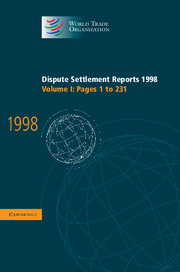Book contents
- Frontmatter
- Contents
- European Communities - Regime for the Importation, Sale and Distribution of Bananas, complaints by Ecuador, Guatemala, Honduras, Mexico and the United States (WT/DS27): Award of the Arbitrator under Article 21.3(c) of the DSU
- India - Patent Protection for Pharmaceutical and Agricultural Chemical Products, complaint by the United States (WT/DS50): Report of the Appellate Body
- India - Patent Protection for Pharmaceutical and Agricultural Chemical Products, complaint by the United States (WT/DS50): Report of the Panel
- European Communities - Measures Concerning Meat and Meat Products (Hormones), complaints by the United States (WT/DS26) and Canada (WT/DS48): Report of the Appellate Body
India - Patent Protection for Pharmaceutical and Agricultural Chemical Products, complaint by the United States (WT/DS50): Report of the Appellate Body
Published online by Cambridge University Press: 24 July 2020
- Frontmatter
- Contents
- European Communities - Regime for the Importation, Sale and Distribution of Bananas, complaints by Ecuador, Guatemala, Honduras, Mexico and the United States (WT/DS27): Award of the Arbitrator under Article 21.3(c) of the DSU
- India - Patent Protection for Pharmaceutical and Agricultural Chemical Products, complaint by the United States (WT/DS50): Report of the Appellate Body
- India - Patent Protection for Pharmaceutical and Agricultural Chemical Products, complaint by the United States (WT/DS50): Report of the Panel
- European Communities - Measures Concerning Meat and Meat Products (Hormones), complaints by the United States (WT/DS26) and Canada (WT/DS48): Report of the Appellate Body
Summary
INTRODUCTION
India appeals from certain issues of law and legal interpretations in the Panel Report, India - Patent Protection for Pharmaceutical and Agricultural Chemical Products (the “Panel Report“). The Panel was established to consider a complaint by the United States against India concerning the absence in India of either patent protection for pharmaceutical and agricultural chemical products under Article 27 of the Agreement on Trade-Related Aspects of Intellectual Property (the “TRIPS Agreement“), or of a means for the filing of patent applications for pharmaceutical and agricultural chemical products pursuant to Article 70.8 of the TRIPS Agreement and of legal authority for the granting of exclusive marketing rights for such products pursuant to Article 70.9 of the TRIPS Agreement. The relevant factual aspects of India's “legal regime” for patent protection for pharmaceutical and agricultural chemical products are described at paragraphs 2.1 to 2.12 of the Panel Report.
The Panel Report was circulated to the Members of the World Trade Organization (the “WTO“) on 5 September 1997. The Panel reached the following conclusions:
On the basis of the findings set out above, the Panel concludes that India has not complied with its obligations under Article 70.8(a) and, in the alternative, paragraphs 1 and 2 of Article 63 of the TRIPS Agreement, because it has failed to establish a mechanism that adequately preserves novelty and priority in respect of applications for product patents in respect of pharmaceutical and agricultural chemical inventions during the transitional period to which it is entitled under Article 65 of the Agreement, and to publish and notify adequately information about such a mechanism; and that India has not complied with its obligations under Article 70.9 of the TRIPS Agreement, because it has failed to establish a system for the grant of exclusive marketing rights.
The Panel made the following recommendation:
The Panel recommends that the Dispute Settlement Body request India to bring its transitional regime for patent protection of pharmaceutical and agricultural chemical products into conformity with its obligations under the TRIPS Agreement …
- Type
- Chapter
- Information
- Dispute Settlement Reports 1998Volume I: Pages 1-231, pp. 9 - 40Publisher: Cambridge University PressPrint publication year: 2000



